Tributes are being paid to Cardinal
Thomas Winning, the leader of the Roman Catholic Church in Scotland.
Cardinal Winning died at his home in
Glasgow on Sunday, at the age of 76.
The head of the Roman Catholic Church
in England and Wales, Cormac Murphy-O'Connor, Archbishop of
Westminster, praised the "humour, dedication, and utter
loyalty" of the cardinal.
And Scotland's politicians were
deeply saddened by the death of a man described as a "staunch
advocate of the values and principles which should underpin our
society".
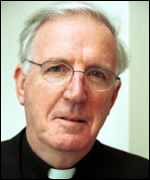
Archbishop
Murphy-O'Connor: "Close friend"
|
Archbishop Murphy-O'Connor said: "I
am deeply saddened to hear of the death of Cardinal Tom Winning.
"He was an outstanding leader of
the church in Scotland and beyond.
"His humour, dedication, utter
loyalty and unstinting defence of the Catholic church will long be
remembered.
"I deeply mourn a close friend.
Catholics in England and Wales will join with those in Scotland in
prayer for the repose of the soul of a good shepherd and pastor, may
he rest in peace."
A mass will be said for the Cardinal
at Westminster Cathedral, in Victoria Street, central London, at
1730BST on Monday.
Scotland's First Minister Henry
McLeish said Cardinal Winning was a man he "greatly respected
and admired".
A spokesman for Deputy First Minister
Jim Wallace echoed the sentiments of Mr McLeish.
The leader of the Scottish National
Party John Swinney said he was "extremely saddened".
He said: "He was well-loved and
will be sorely missed by the whole nation."
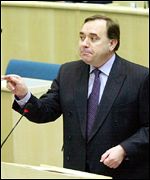
Alex Salmond:
"Fearless fighter"
|
The leader of the SNP at Westminster
Alex Salmond said he was proud to count Cardinal Winning as one of
his friends.
"I think he will be remembered
as a fearless fighter for the poor and dispossessed.
"Sometimes during the 1980s, he
was almost a one-man opposition to Thatcher's social policies.
"He was never feart. He would
take on any establishment and he took on that establishment at the
height of its powers."
The Scottish Parliament's Presiding
Officer Sir David Steel said the cardinal will be "greatly
missed not just by his own flock but by the whole country".
"He will be remembered for his
robust contributions to public debate on a range of issues. He tried
to lift the eyes of Scots from our own problems to the third
world."
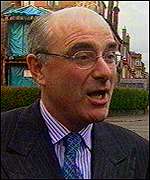
David McLetchie:
"Great moral leader"
|
Scottish Tory leader David McLetchie
said: "I was very sorry to hear of the death of Cardinal
Winning. He was one of the most eminent and distinguished churchmen
Scotland has produced.
"He was also a great moral
leader, and a staunch advocate of the values and principles which
should underpin our society."
Secretary of State for Scotland Helen
Liddell joined in the tributes, saying she was "greatly
saddened" by the death of the cardinal.
"He was a man of great vision
and immense social conscience," said Mrs Liddell.
"As the first prince of the
Catholic church in Scotland, he was a well-liked and respected
figure who strove throughout his life to improve the lives of all
Scots.

Helen Liddell:
"Greatly saddened"
|
"He was particularly concerned by
the problems of poverty, and worked tirelessly to help those in most
need. He will be sadly missed by Scots of all denominations."
A spokesman for First Minister Henry
McLeish said the death will be a "tremendous loss".
Prime Minister Tony Blair was said to
be "shocked and saddened to hear of Cardinal Winning's sudden
death".
A statement issued by Downing Street
said of Cardinal Winning: "His strong moral leadership and
commitment to social justice were renowned.
"His energy, commitment and
passionate defence of the core values of the Catholic church and
faith were recognised by all. He will be greatly missed."
Chancellor Gordon Brown, MP for
Dunfermline East, said: "Cardinal Winning will be sorely
missed. He was a great Scot and a great Christian.
"I was proud to know him and his
great achievements will be remembered for many years to come.
"He was a passionate opponent of
poverty both in Britain and in the Third World."
Some photographs from the funeral
service








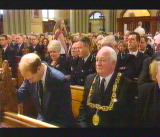
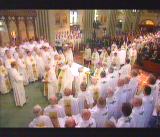
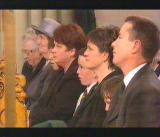
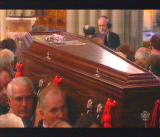
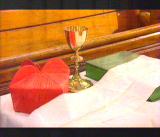
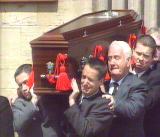
Mini Biography
G.C.H.S., S.T.L., D.C.L.,
D.D., D. UNIV., LL.D., F.E I.S.
Born, Wishaw, Scotland, 3rd June, 1925
only son of Thomas Winning and Agnes Winning (nee Canning) brother of
Margaret Winning, now Mrs Edward McCarron.
Educated at St. Patrick's Primary
School, Shieldmuir and Our Lady's High School, Motherwell.
Accepted as a student for the
Archdiocese of Glasgow, completed philosophy studies at St. Mary's
College, Blairs, 1941 -1943
Theology studies began at St. Peter's
College, Bearsden, Glasgow and, at the end of the Second World War,
one of the first group of students to return to Rome to the newly
re-opened Pontifical Scots College. Studied there from 1946 - 1949.
In 1948, two Suffragan Sees created
from the territory of the Archdiocese of Glasgow and in this
re-organisation became a student of the newly erected Diocese of
Motherwell.
Ordained priest in Rome on 18th
December, 1948, for the Diocese of Motherwell.
Graduated, Gregorian University, 1949 -
STL (Licence in Sacred Theology), returned to Scotland, appointed
assistant priest at St. Aloysius, Chapelhall until 1950.
In 1950 returned to the Scots College,
Rome, studied Canon Law, Gregorian University - DCL (Doctor of Canon
Law), 1953.
Assistant Priest, St. Mary's, Hamilton
from 1953 to 1957; Our Lady of Good Aid Cathedral, Motherwell from
1957 - 1958. Secretary, Diocese of Motherwell, 1956 - 1961.
Chaplain to the Franciscans of the
Immaculate Conception, Bothwell 1958 -1961.
Spiritual Director, Pontifical Scots
College, Rome 1961 - 1966; qualified as an Advocate of the Sacred
Roman Rota, 1965.
Parish Priest, Saint Luke's, Motherwell,
Officialis of Motherwell Diocesan Tribunal and Vicar Episcopal for
Marriage in Motherwell Diocese from 1966 until 1970.
First President and Officialis
of the newly established Scottish National Tribunal, Glasgow, 1970
-1972.
On 22nd October, 1971, nominated to the
Titular See of Louth as auxiliary bishop in the Archdiocese of
Glasgow; ordained to the episcopacy by Archbishop James Donald Scanlan
in Glasgow on 30th November, 1971. Vicar General, Archdiocese of
Glasgow 1971 - 1974 and parish priest of Our Holy Redeemer Parish,
Clydebank 1972 - 1974.
Translated to the Archdiocese of
Glasgow on 23rd April, 1974 on the retirement of Archbishop James
Donald Scanlan.
President, Justice and Peace Commission
of Bishops' Conference of Scotland 1973 - 1977.
President, National Commission for
Social Welfare of Bishops' Conference of Scotland 1974 - 1984.
President of the Catholic Education
Commission, Bishops' Conference of Scotland 1977 - current
Member of the Sacred Congregation for
the Doctrine of the Faith from 1978 to 1984.
President, Bishops' Conference of
Scotland 1985 - current
Delegate, Bishops' Conference of
Scotland, to COMECE (The Bishops' Conferences of the European Union)
1990 - 1996
Member of CCEE (The Bishops'
Conferences of Europe)
Honorary degree of Doctor of Divinity,
The University of Glasgow, 1983;
Fellow of the Educational Institute of Scotland, 1986;
Knight Commander of the Holy Sepulchre and Grand Prior of the Scottish
Lieutenancy of the Equestrian Order of the Holy Sepulchre of
Jerusalem, 1989; promoted to Knight Grand Cross 1995,
honorary degree of Doctor of the University, University of Strathclyde,
1992;
honorary degree of Doctor of Law (Aberdeen University) 1996.
Created Cardinal Priest, 26 November,
1994, by His Holiness Pope John Paul II with the Title of S. Andrea
delle Fratte.
Member, President's Committee,
Pontifical Council for the Family (Dec 1994 - Current).
Member, Pontifical Council for
Promoting Christian Unity (Dec 1994 - Current).
17th March, 1997 - Appointed
Special Envoy of the Holy Father to the Saint Columba Celebrations in
the Dioceses of Derry and Raphoe, Ireland, in June of 1997
|
9TH MARCH
1997
REF M1-97
|
SOCIETY FOR THE PROTECTION OF UNBORN CHILDREN
ADDRESS BY CARDINAL THOMAS J. WINNING
AT CALEDONIAN UNIVERSITY
|
Ladies and Gentlemen,
First of all Iíd like to thank you for the
invitation to speak to you about the pro-life issue in these weeks
leading up to the General Election campaign.
As you may have noticed, it is an
issue which Iíve once or twice (!) highlighted in recent months,
not necessarily to the liking of politicians of varying persuasions.
What I want to do today is share
with you some of my thoughts on this issue and encourage you in your
work of highlighting the slaughter of the innocents which takes
place day in and day out in hospitals and clinics all round Britain.
Before I do that I want to tell
you a story.
In many ways itís not an
uncommon story, but itís a tragic one nevertheless.
There was once a man named
Bernard. Bernard was a married man, but was compulsively
promiscuous. One day Bernard was told by a woman with whom he was
having a relationship that she was pregnant with his child. Bernard,
being what most of the media would term a practical sort of chap,
decided there was only one thing for it. He demanded that she
terminate the pregnancy as a condition of the relationship
continuing.
The woman in question accepted his
condition and the baby was aborted.
A tragic story? Yes few people
would disagree with that.
But thereís more to it than
that. Something more sinister.
Bernard was a doctor by
profession.
He was an expert in obstetrics and
gynacology.
Bernard was an accomplished
abortionist in his own right.
Bernard killed his own child.
But thereís more. In a book
published recently Bernard went on to explain the procedure, and
then said, in words that remind one of the famous Goya painting of
Saturn devouring her children:
"You pursue me. You ask if
perhaps for a fleeting moment or so I experienced a flicker of
regret, a microgram of remorse?
"No and No."
Thatís a harrowing story, that
just happens to be true. And it reveals clearly the mentality of the
abortionist - another job well done, another deminstration of the
moral neutrality of advanced technology in the hands of the amoral.
That, my friends, is the mentality
we are up against in our struggle for life.
For a long time Iíve been
searching for a satisfactory reason for societyís general refusal
to recognise abortion for what it really is, namely, directly
depriving an unborn baby of life.
Of course there can be more than
one explanation for this failure to analyse the problem correctly.
For some the explanation will be a
purely selfish one - "I believe that the unborn baby is a human
being, but it is unwanted for personal and social reasons, so Iím
quite prepared to ask for its removal."
The fact that this removal
involves the death of the unborn baby is usually cushioned by the
sanitised way the operation is carried out.
But what it means is that motives
of personal convenience are now sufficient to sign a childís death
warrant.
Other people may fail to see the
reality of what they are doing because the pro-abortion lobby have
succeeded very well in creating a vocabulary of their own which
cushions the impact.
Last week in the Scotsman
newspaper, one of our most eminent moral theologians, Fr George
Donaldson had a letter published which exposed the powerful way
language is used to distract people from the reality of abortion -
namely killing.
In it he quoted Jane Roe of the
Abortion Law Reform Association, who appeared on the BBCís
Womanís Hour last year. She was asked why her group calls itself
"pro-choice". She was honest enough to answer frankly.
"Itís partly a campaigning
tactic," she said. "We know people support choice. They
are happy. If you ask them if they support a womanís right to
choose, almost 100 % say yes.
"If you say abortion on
request" itís slightly fewer.
"And if you say abortion on
demand" itís fewer still, when ALL THREE MEAN EXACTLY THE
SAME THING."
These words, remember, are not
mine. These are the words of those who want - letís be blunt about
it - abortion on demand.
When you analyse the subtleties of
our opponents on this issue, itís perhaps easier to understand why
some people almost sleepwalk into the abortionistís clinic.
I feel increasingly convinced that
the most satisfactory explanation for societyís failure to call a
spade a spade is that society itself has a flawed judgement. And
that flaw is due to the fact that people are no longer anchored in a
stable set of values and principles by which to live their lives.
That means that the over-riding
touchstone of morality becomes "does it suit me?"
When that mentality takes over -
and already it is making dangerous inroads - then all of us are at
risk. First the unborn, then the frail elderly, then the disabled,
then the sick and before you know it we have a society where people
are no longer valued for who they are but what
they are worth.
Pope John Paul has a name for that
kind of sick society.
He calls it "The Culture of
Death".
Itís against that culture of
death that we are called to fight. And today I want to announce a
bold new initiative which I hope will begin to turn the tide in some
way.
Today I issue an open invitation
to any woman, any family, any couple who may be facing the
possibility of an unwanted pregnancy.
I strenously urge any person in
that situation, of any ethnic background, of any faith, from
anywhere, to come to the Archdiocese of Glasgow for assistance.
Today I can announce a new set of
provisions which have been put in place to help you.
Whatever worries or cares you may
have ... we will help you.
If you need pregnancy testing or
counselling ... we will help you.
If you want help to cope with
raising the baby on your own ... we will help you.
If you want to discuss adoption of
your unborn child ... we will help you.
If you need financial assistance,
or help with equipment for your baby and feel financial pressures
will force you to have an abortion ... we will help you.
If you cannot face your family, or
if pressure in your local area is making you consider abortion, come
to us, we will help find you somewhere to have your baby surrounded
by support and encouragement. We will help you.
And finally, if you have had an
abortion. If you are torn apart with guilt, if your relationship has
split up because of abortion, if you are suffering from post
abortion stress - come to us, we will help you.
This invitation, I repeat, is open
to all. Irrespective of age, creed or colour.
Today I urge anyone in that
situation ... Let us help you to avoid making one of the biggest
mistakes of your life.
Call us at our archdiocesan
headquarters from tomorrow onwards. We will help you in whatever way
you need.
I make this pledge today as a
genuine and practical response from the Archdiocese of Glasgow to
this fundamental problem facing society.
I feel our efforts to offer every
practical help, and provide every alternative to abortion
complements your work to raise political awareness of the issue.
Your role as campaigners for
political change is different from ours. What Iíve just spelled
out is the Churchís practical response to the problem of abortion.
Your role is to change minds and hearts among those who have the
power to shape our society for good or for evil.
We co-operate very well and we
share the same ultimate goal. I want to congratulate you today for
all you have achieved in the last 30 years. From small beginnings
when barely a couple of dozen MPs voted against the 1967 abortion
bill we now have several hundred members of parliament who can be
relied upon to vote to uphold the right to life of the unborn child.
Much of that success is due to the
work of the Society for the Protection of the Unborn Child.
But even away from the parliamentary
lobby, in your daily work, in your quiet apostolate with your
friends and colleagues your efforts do have an effect.
Let me read you a passage written by
someone who was no friend of the pro-life movement, yet was moved
by the integrity of the people who campaigned ceaselessly against
abortion.
He writes: "They prayed, they
supported each other, they sang hymns of joy and they constantly
reminded each other of the absolute prohibition against violence.
They prayed for unborn babies, for the confused and pregnant
women, and for the doctors and nurses in the clinic. They even
prayed for the police and the media who were covering the event.
"And I wondered: how can these
people give of themselves for a constituency that is (and always
will be) mute, invisible and unable to thank them?"
The man who wrote these words is
someone you already know.
His name is Bernard.
He is the father who aborted his own
child.
Over time Bernard Nathanson - thatís
his full name - did see the light. He saw more than that. With the
aid of new technology he saw the child in the womb.
He saw that what he had been aborting
by the thousand was in fact a human being. By the time he realised
that, he had killed 75,000 babies.
In recent years Bernard Nathanson has
stopped performing abortions and become one of the best known
advocates of the pro-life cause in the United States.
What changed his mind, was the witness
of people like you.
Thatís why I want to end this
contribution with an appeal to you, not to lose heart.
Your efforts may sometimes seem to go
unrewarded, but you can be sure that slowly and surely you are
having an effect.
For evidence of that you only need
look at the recent outrage at the abortion of the healthy twin; of
the pressure to abort the octuplets last year or the recent furore
over calls by a nobel prize winner to abort children who would not
turn out to be good at music.
Public opinion is turning. It may be
slow, but itís turning.
And I think that we have good grounds
for hope that in the new millenium we will see the culture of
death with which we are currently grappling, give way to something
new.
Pope John Paul has a name for that
something new too. He calls it a "civilisation of life."
Thanks to you and people like you,
that civilisation of love is beginning to take shape.
Thank you.
CARDINAL SPARKS OUTRAGE
AFTER CALLING HOMOSEXUALITY "A PERVERSION"
GLASGOW (CWNews.com) - Scotland's
Cardinal Thomas Winning came under fire yesterday after he branded
homosexuality a "perversion."
Speaking in support of businessman Brian
Souter who has offered millions of British pounds to help fight the
repeal of Clause 28 -- the so-called anti-homosexual law -- the cardinal
said: "I deplore homosexual acts."
"I hesitate to use the word
perversion but let's face up to the truth," he said. "What
pains me is that the silent majority are so silent that the silence is
deafening. I wish to God they would speak up. But when you do say
something about it, you are accused of homophobia which is absolute
rubbish."
He added, "I have no objection to
anybody. I'm supposed to love my neighbor and I try to do that as much
as I can. But I will not stand for this kind of behavior which is now
being regarded as wholesome and healthy."
He continued: "Homosexuality is
promoted every day. It's promoted by people who are on the streets, it's
promoted by people who are attracted to others. We only need to look at
some of the pamphlets available to see just exactly what is in place to
put into schools. I am concerned that children might be converted by
some of the literature. There's no doubt about it."
A Look at What Is.
On 17 January 1999, Cardinal Thomas Joseph Winning,
Archbishop of Glasgow, celebrated Mass in thanksgiving for his golden
jubilee of priesthood. In his homily, printed here, the Cardinal
reflected on the role of the shepherd, and on family life and
priesthood.
One of my earliest experiences as a young student in
Rome was my first visit to the catacombs. It was there that I first saw
the second century statue of the Good Shepherd, Jesus. The young
shepherd cradling a lamb with a sheep at his side has become my
favourite image of Jesus who in turn is my icon of priesthood.
A shepherd's job is both simple and complex. Keep an
eye on the flock; but make sure they have enough to eat and drink; and
are protected. As they munch and munch and munch, there is nothing much
the shepherd can do but be there.
Many a shepherd has profited from the time to sit
around and contemplate and reflect. Some of the saints found their first
hours of contemplation guarding sheep.
Someone has described contemplation as taking a long
loving look at what is and I would go along with that. Jesus was
inclined that way: "The kingdom of God is like a treasure ...
consider the lilies of the field."
His contemplation led him to spending the night in
prayer before making decisions, planning the formation of his disciples
and taking a long loving look at what is. All the words are crucial:
"at what is": at what there is - around me, about me, not of
my doing, not "at what I have" - that would be a self-centred,
navel-gazing exercise.
After fifty years of active ministry there are areas
in my life I can take a long loving look at. And the first of these is
family life. The family is the smallest but the most precious cell in
human society. It is where, naturally, love presides and life-values are
passed on from one generation to the next. That this does not happen in
all families is a human tragedy.
For some sections of our contemporary society the
husband-wife-children family is only one model amongst many. As a
Christian I have to acknowledge the reality of other family forms, but
for me and my Church there is only one model according to divine and
natural law, and the sooner society returns to it, the healthier we will
all be. The model: husband, wife, child, in a stable environment.
Currently, the family is undergoing a traumatic period
and there can be little doubt that there are very well organised and
resourced forces at work in our society which are hell-bent - and I use
those words advisedly - on destroying the Christian family. To those
people I say: you will not conquer. You will not succeed in destroying
the Catholic Church's commitment to the family whether you use all-out
assaults on the institution of marriage or try to trick us under the
guise of political correctness into accepting all sorts of lifestyles
which are quite simply unacceptable to the Christian.
I have been greatly influenced by my family and by my
bigger family, the family of God. Here what has bonded me to this family
in a concrete existential way has been the kindness and openness, the
humility and at times the powerlessness of the members.
Jesus once looked on the crowds and felt sad. They
were harassed and "looked like sheep without a shepherd".
Fortunately, the family of God here has no lack of shepherds, and I have
learnt and am still learning from the example and the self-sacrificing
life of my brother priests. They are truly "men for others".
We live in an era of unending change: theological and
social factors have seen many changes in the priestly office and the
priest's own personal understanding of his office. Without prejudice to
the unchanging nature of the institution of the Catholic priesthood, the
concrete form the priestly ministry assumes in the course of the history
of the Church can and should undergo modifications to meet current
needs. In such a period of transition we priests must maintain an
attitude of patience and courage with ourselves, our office and the
Church we serve: to learn to live with those factors that the world
questions because it fails to view them from a faith perspective, and so
regards them as outdated and even impossible to maintain.
What we have to do, and I hope are doing, is that
while we may legitimately ask ourselves what the active ministry will be
like in a hundred years, this is far from society's fascination for
prophesying or from a capricious conjuring up of wishful thinking and
dreams. We should never allow the world's opinion of us to paralyse our
ministry or minimise our firm and unquestioning conviction of faith that
the priesthood we share will always exist in the Church.
Sometimes people say the morale of the clergy is low.
The morale of teachers is low because of the extra demands made on them
in recent years. The morale of young doctors is low because of the
excessive hours they have to work. The morale of nurses is low because
they are overworked and underpaid.
But the morale of the clergy is not low for those
reasons. They do not feel down because they are underpaid. Nor, may I
say, do they feel low because of the commitment to celibacy. They feel
hurt when they see society rejecting everything they stand for, and when
the media and the secular society try to push God out of people's lives.
It is human to fall short of ideals; but as long as we
cherish and aim for those ideals, there is life and the capacity to be
revitalised. To my mind, a long, loving look at what is must bring about
a surge of gratitude and gratefulness.
To the little child everything is a wonderful gift. In
fact we will remain ever young if we retain that sense of wonder and awe
at what the hand of the Lord offers us.
Today as you celebrate fifty years of priesthood with
me, I wish to say to my brother priests, for as long as I remember the
priest has been a model for me. You have continued to reflect that image
in my mind. Not once in my life as a bishop has a priest refused to
undertake a role I offered, no matter how arduous or demanding.
The bond between bishop and priest is a sacramental,
ecclesial, invisible one. There is no written contract of employment,
only a commitment to Jesus Christ and the Church. If that commitment
degenerates, the Church has no real hold and indeed would not want to
have one. What keeps each of you active as priests is your faith in
Jesus Christ and no other consideration - certainly no material benefit.
That is why I include you in my list of gifts from the Lord.
When I was a young priest the clergy rarely talked
shop at meals together. Since Vatican II, life has become more serious,
but we have never lost our collective sense of humour, and even in the
saddest of circumstances there is still the ability to laugh, the
ability to love life, to feel fulfilled, to take a long loving look at
what is, and to say, "Deo gratias".

